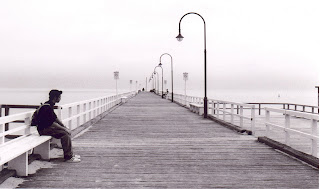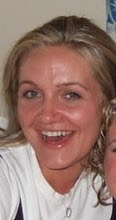Today's guest post is from S.M. Carriere, an incredibly prolific Canadian writer, who usually pens 3000 words a day. Anyone with that kind of drive ought to have some advice on the writing process. Her blog is called An Author's Journey. Read on to find out more.
Musing About Writing, by S.M. Carriere
Certain friends of mine throw their hands up in the air at my writing process. To be fair, if I had been formally trained as they had, I might get a bit annoyed as well. Actually, I probably wouldn't. I'd be interested in the different process, but reserve judgement. Let's face it. There's not one correct way to draw, or paint, or sculpt. Why would there be to write? I digress.
I've explained the process before, but in case you did not read that post, I'll cover it again.
I plan virtually nothing. The main character/protagonist jumps into my mind almost fully formed, along with a scene or two about what it is they are up to. The next thing that comes into my head is the ending of the story.
It's as if a ghost appeared before me and said, 'I am [insert name]. This is how I died/won/lost/insert other appropriate ending. Now let me tell you about how this came to be.'
That's all I have before I start writing. The character, a couple of scenes, and the ending. I write one of the scenes, and the entire story flows through until it ends. That means when I begin any one story, I have no idea how long it's going to be. I don't know what exactly happens to my characters. The story is as much an adventure to me writing it as it is to those reading it for the first time.
The Seraphimé Saga began this way. It ended up being two books.
The Great Man series began this way. It ended up being five books.
Every single short story I have ever written had started out this way.
My afore mentioned nosey friends laugh about how mixed up my stories must be. Surely there are major plot inconsistencies? There must be gaping holes everywhere one looks. Then they go on about how poorly everything must flow, how badly fleshed out my characters must be, how terrible my imagery, place-setting, etc.
All without reading a single word.
Sure, I didn't go to school to to be formally instructed on how to plan every step of a story. Sure, I do it differently than they teach at those institutions. That doesn't make it wrong, or inferior. In fact, other than a mix up with seasons/time in The Seraphimé Saga, most everything turned out as if I'd painstakingly plotted every single point.
Here's the thing, nay-sayers. I trust my characters. When that ghost of a person floats around in my head and says, 'Let me tell you how it came to be.' I trust that they will tell me how it came to be. They've yet to let me down.
In fact, my characters, or rather, these characters (they are far too free-willed for me to make any claims of possession), are so insistent on telling me, that if I try telling them (i.e. - plotting the story before I write it), I run into serious, serious trouble. The example that most sticks out in my mind, and it's the same example I use each time because it turned me into a complete wreck, is during the writing of the final part of The Great Man series.
A character I was extremely fond of died. It was a very brave, very noble death, mind. But he still died. I didn't want him to die. I fought that death tooth and nail. Fighting with the story had me stuck in limbo for fully six months. The story refused to budge until that character died. It took everything out of me to write that death. I wrote with tears streaming down my face. When it was all said and done, I was in such distress, I had to call my mother. Even thinking about it now, I get all bleary-eyed.
Once that death was written, however, the rest of the story gushed out of me like a dam had burst. Three weeks later, the entire series was more or less written.
The weird thing is, I had plotted out The Great Man series at the very earliest stages of writing. Once I had the ending, the protagonist and a couple of scenes, I set about marking every single plot point I possibly could. The story, however, had other ideas. Once I started writing, I found that the flow of words was inescapable, and that flow was taking me places I hadn't planned. When I tried to swim against the current, as it were, I found myself drowning. Things became a lot easier when I went with the flow. The story I have now is vastly different from the story I had plotted. I'm not sorry about it either. Julian's version is much, much better than my own.
My writing process is very much intuitive. It isn't as structured as some people's writing processes. Both have their merits. I have found that the structured approach just doesn't work for me, though not for lack of trying.
As far as editing afterwards goes, I have found that I'm editing for much the same things as someone with a more structured approach would. I'm editing out passive voice (or trying very hard to), spelling and grammar issues, and so forth. These are all things people who write from a pre-prepared plot edit as well. I've very rarely had issues with continuity. The characters know their stuff.
So, people who tell me, or anyone else, that their writing process is 'wrong' or 'inferior,' go jump! It works for me, just as yours works for you. There is no one 'correct' way to write.
I really should have titled today's post 'Ranting About Writing.'
Born in 1983 in Quito, Ecuador, S.M. Carrière has lived in five countries around the world including Ecuador, Gabon and The Philippines. The family moved to Australia from The Philippines shortly after the commencement of hostilities there in 1989.
After graduating High School, S.M. Carrière worked full time as an Office Junior at a law firm in Brisbane, Queensland before moving to Canada in 2001. In 2002 she began her academic career beginning in Criminology, but switching to Directed Interdisciplinary Studies (focusing on Perhistoric Anthropology and Archaeology) after her first year. She graduated with a B.A. Hon from Carleton University in 2007 with honours.
It wasn't until well after graduation that she decided she wanted to be an author.
S.M. Carrière now resides in Canada with her two cats and a growing collection of books.
What about you? What is your writing process?




















